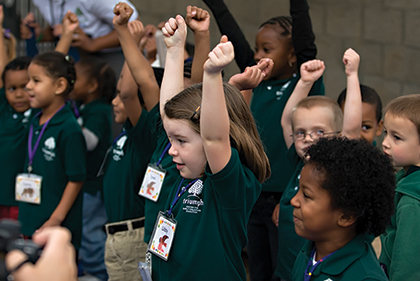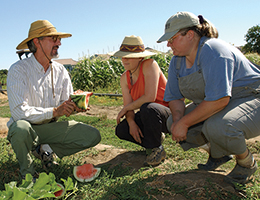
The Triumph Center for Early Childhood Education will provide research to improve education nationwide.
Innovative programs provide opportunities for low-income students
New blocks, dolls and books greeted the 3- and 4-year-olds in the inaugural class at the Triumph Center for Early Childhood Education this fall. So did these sobering statistics: For every 100 low-income students who make it to high school, only 65 will graduate, 45 will enroll in college and 11 will earn a college degree.
At Triumph, a collaboration of the UC Davis School of Education, M.I.N.D. Institute and St. HOPE Public Schools, UC Davis is leading the search for answers to turn these numbers on their head. The hope: By combining quality education with state-of-the-art assessment and interventions, Triumph will help prepare every child for success in kindergarten and throughout school.
Located in Sacramento’s historically underserved Oak Park neighborhood, Triumph is just one of the innovative laboratories in which UC Davis is changing the lives of area students while providing research that will improve education nationwide.
West Sacramento Early College Prep, a partnership of the UC Davis School of Education, Sacramento City College and Washington Unified School District, also opened its doors this fall. Low-income students whose first language is not English and whose parents did not go to college get enrollment priority.
UC Davis faculty and students will help design and assess the curriculum and mentor teachers and students. WSECP students will be able to earn both high school diplomas and up to two years’ worth of college credit. Everyone will learn whether an all-out effort to foster a “college for certain” culture can get more underserved kids through college.
“These initiatives reflect the core values of our institution,” says Harold Levine, dean of the UC Davis School of Education. “It’s our mission to strengthen teaching and learning for all through cutting-edge research, interdisciplinary collaboration, deep and sustained engagement with practitioners and community partners, and work that fundamentally bridges research and practice.”
2007 EDUCATION

New major prepares ag and environmental science teachers
Concerned that training of agricultural teachers is not keeping up with the demand for these specially trained educators, UC Davis has developed a new agricultural and environmental science education major, offered for the first time in fall 2007. The new major, a collaborative effort by the College of Agricultural and Environmental Sciences and the School of Education, will provide students with a broad background in agricultural and environmental sciences, as well as the social sciences related to human-resource development.
Los Rios to build community college center at UC Davis
A project to build a community college branch at UC Davis — a first for a UC campus — was heralded as a demonstration of a strong partnership and shared commitment to students. The Los Rios district plans to build 60,000 square feet of classroom and office space to house the new Davis Center, which is a branch of Sacramento City College.
Grade 4 program sees first students enroll at UC Davis
Nine years ago, UC Davis Chancellor Larry Vanderhoef stood before fourth-grade students in a hardscrabble neighborhood in Sacramento and invited them to see themselves as future university students. Five of those students, part of the inaugural Reservation for College group, started classes at UC Davis this fall and received an annual grant of $6,000, renewable to a maximum of $7,500 in the fourth year. The grants are made possible by funds from the university’s endowment and other contributions, including gifts from the estate of Mary Rogers and from Jean and Russell Fiddyment. Pacific Gas & Electric Co. also provided funds to develop the program’s curriculum.
Teacher research academy could make science teachers more effective
UC Davis received a $300,000 grant from the National Science Foundation to measure how the pairing of middle school and high school teachers with world-class scientists at the Lawrence Livermore National Laboratory affects teacher performance in the classroom. An innovative approach to improving science education in California — known as the Teacher Research Academy — has earned rave reviews from participating teachers since its launch in 2004.
